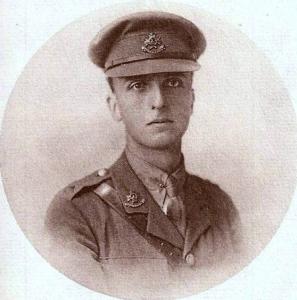
|

|
| 2nd Lieutenant Harold Andrew SMITH | |
|
A Company, 2/6th Battalion Nottinghamshire and Derbyshire Regiment (Sherwood Foresters) Date of birth: 8th September 1893 Date of death: 21st March 1918 Killed in action aged 24 Commemorated on the Arras Memorial Bay 7 |

|
| Harold Andrew Smith was born in Birmingham on the 8th of September 1893 the second son of Andrew Clifford Smith, a retailer, and Eva Olive (nee Willsher) Smith of 188 Charles Road, Birmingham, later of 24 Roy Street, Wellington in New Zealand. He was educated at Lancing College where he was in Olds House from the 26th of September 1907 and in News House until the 26th of July 1911. He was a member of the Officer Training Corps. He went on to Kelham Theological College at Newark in Nottinghamshire from 1912 to 1915. He enlisted into the army as Private 4454 in the 3/8th Battalion Nottinghamshire and Derbyshire Regiment (Sherwood Foresters) on the 19th of November 1915. At a medical examination, which was held on the same day, it was recorded that he was five feet eleven inches tall. He was posted to the battalion's signal section at The College, Mirfield in Yorkshire where he qualified as a Signaller and volunteered for overseas service on the 24th of November 1915. He embarked for France on the 11th of June 1916, landing there the following day and joined the 1/8th Battalion of his regiment in the field on the 13th of June. He applied for a commission on the 21st of December 1916 in an application which was supported by the Reverend Bowlby, Headmaster of Lancing College, and by Alan Haig-Brown, Commanding officer of the Lancing College Officer Training Corps. He returned to England for officer training on the 2nd of January 1917 and was posted for training to 20 Officer Cadet Battalion in Hampshire on the 6th of February 1917. He was commissioned as a 2nd Lieutenant in the Nottinghamshire and Derbyshire Regiment (Sherwood Foresters) on the 29th of May 1917. On the 21st of March 1918 the Germans launched their spring offensive in an attempt to break the allied lines before the arrival of the Americans in France could make a significant impact. In preparation they massed huge numbers of troops and artillery ready for the attack. During the night of the 20th/21st of March 1918 the 2/6th Battalion Sherwood Foresters were in front line trenches at Mory L'Abbaye near Bullecourt. Patrols were sent out into no man’s land during the night but failed to notice anything unusual. At 5am on the 21st of March the Germans opened a massive artillery barrage, much of which was concentrated against the part of the Sherwood Foresters lines known as Railway Reserve. At the same time they fired trench mortars on the outposts in front of that position. At 9am the bombardment stopped and the German infantry rushed forward but were met by fierce fire from the Foresters line and were driven back. At 10am the Germans attacked again but concentrated their assault against Railway Reserve itself. This attack was also halted with bitter close quarter fighting, the British defenders having been reinforced. At 10.30am the Germans managed to move around the flank, occupying a trench called Sidney Avenue from where they were able to enfilade the Nottinghamshire men with trench mortar and machine gun fire inflicting very heavy casualties among the defenders. Orders were received calling for a bayonet charge to be made to retake the captured position but not enough men could be found to carry it out. Through bombing their way up the trenches, the enemy were able to capture most of the railway embankment. The Commanding Officer gathered all his signallers, servants and runners from battalion headquarters who, despite being surrounded, fought until their ammunition was expended and the position finally fell. Casualties were 131 men of all ranks. Harold Smith was posted as missing during the attack. At the end of the war a statement was taken from Private J.R. Borrowdale, a member of his platoon, who had been with him when he was killed and had been captured during the fighting. He had returned from captivity to Hull on the 29th of November 1918: - "On 21st March the enemy launched a strong attack where we were (at Bullecourt between the village of Mory and Noreuil) the fighting was very heavy. About 9am the enemy pressed very suddenly and Lieutenant Smith seeing that we were surrounded immediately wrote a message and as I was standing next to him he handed the message to me and said "Take that to the Adjutant". The last words had scarcely been spoken when, quite unexpectedly, the enemy commenced to "strafe" us with hand grenades. The first one that came over hit Lieutenant Smith on the head and he was killed instantaneously. I have not the slightest doubt that he was killed." As a result of this information Harold Smith was officially declared as dead on the 1st of April 1919 and a death certificate was issued to his mother. |
|
| News House |
Back